Every month, we pick a few topics for exploration. The topics we select aren’t meant to cover every issue area facing the progressive community, but rather to give actionable advice on how to talk about key issue areas. We’ll be sharing our findings throughout the month, and in this volume we focus on:
What problems should progressives be spotlighting when it comes to Donald Trump’s approach to trade and tariffs?
Progressives can make the case that Trump’s approach to trade has been characteristically reckless and unnecessarily damaging, imposing high costs for working Americans and, in particular, for American farmers, all while letting powerful corporate interests off the hook.
Public opinion on trade is not clear-cut, and progressives need to find – and speak to – Americans who have yet to form a firm point of view.
President Trump has long railed against unfair trade practices and agreements such as NAFTA. As president, he has relied heavily on the use or threat of tariffs (i.e., taxes placed on foreign imports), something even many progressive experts believe can, if done strategically, be used to the benefit of American workers. But when it comes to Trump’s approach, many Americans are concerned or conflicted. The issue has broken through: 65% of Americans say they have heard “some” or “a lot” about the trade war sparked by Trump’s policies, and 42% have heard something about the impact of the tariffs on their home state economies. The relatively high profile of the issue gives progressives an opening to describe how they might handle tariffs differently.
Democrats in Congress have a narrow advantage over President Trump on trade in general.
The latest Navigator poll finds Trump 13 points underwater on overall job approval (43% approve, 56% disapprove). And on two key pocketbook issues – health care and taxes – Americans prefer the approach of congressional Democrats to President Trump by similar, clear margins. By contrast, Trump holds a small lead on the issue of the economy in general.
“Trade and tariffs” lies somewhere in between: Democrats in Congress are narrowly more trusted (43% Democrats in Congress – 39% President Trump), with a relatively large number of Americans saying they “don’t know enough to say” who is better on the issue. Further complicating the issue, Americans narrowly favor placing tariffs on goods from China, Canada, Mexico and others (45% support – 41% oppose), but well short of a majority. This dynamic underscores how progressives have an opportunity to engage with many people who are less familiar with Trump’s tariffs, or who support them but with reservations.
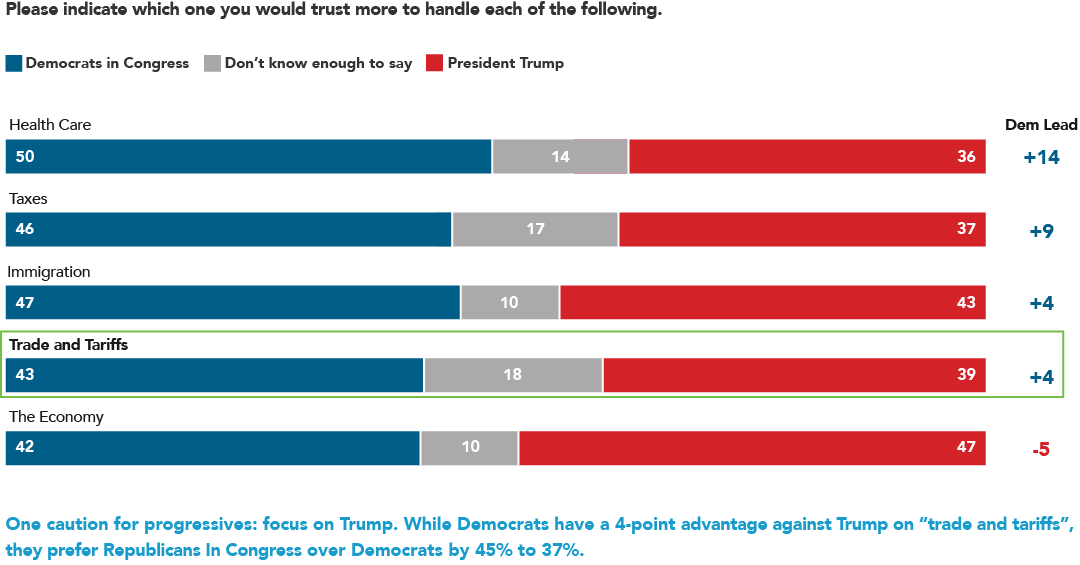
Americans narrowly support Trump’s tariffs, but progressives can speak to the many who remain undecided or conflicted.
There are two distinct groups progressives can still speak to in order to win this issue.
First, the 13% of Americans who are undecided on Trump’s tariffs. This group is not especially sympathetic to the president (68% disapprove, 26% approve), but they are far less likely than average to have heard “some” or “a lot” about the trade war (29%) or the impact of tariffs on their home state’s economy (20%). In other words, many in this group may simply need to hear the case against Trump’s approach to the issue.
Second, the 15% of Americans supporting Trump’s tariffs, but with some reservations. Sixty-two percent of “supporters with reservations” otherwise approve of the president’s overall job performance; for reference, 95% of those without reservations approve of the presi- dent. These two groups of tariff supporters split on a another trade issue: NAFTA. Supporters with reservations view NAFTA more favorably than unfavorably (+21), while supporters without reservations are deeply negative (-38) – more in line with Trump’s own highly critical view.
Importantly, when exposed to progressive messaging about Trump’s trade policies later in the survey, both undecideds and soft supporters are responsive to the messaging – the majority of undecideds and soft supporters say at least one of the progressive messages “raises doubts” about Trump’s approach.
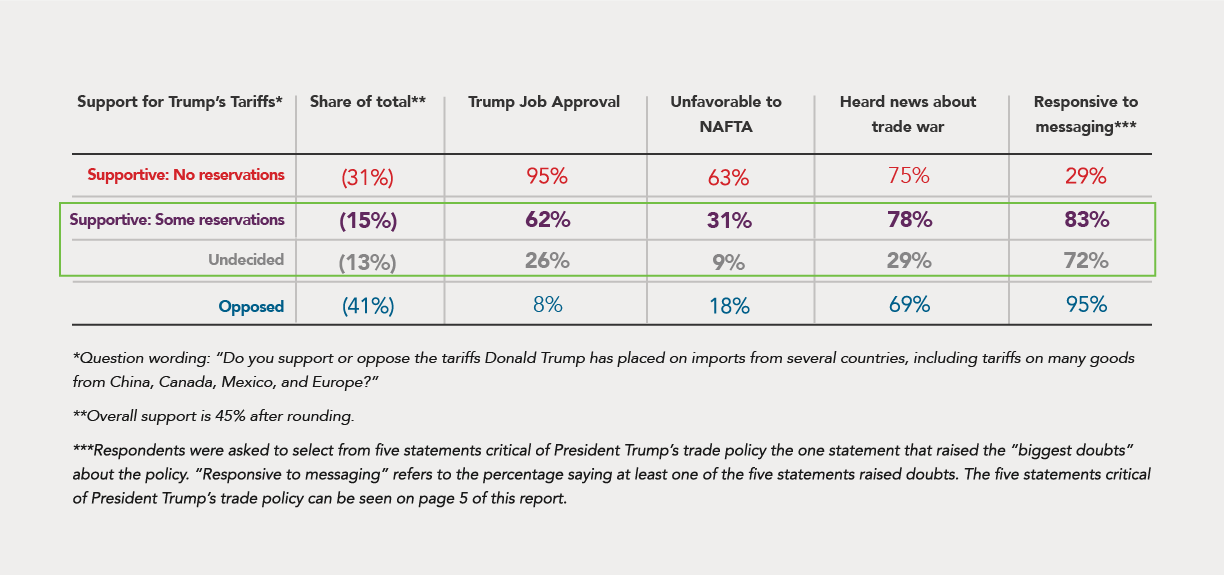
Make the case against Trump’s trade policies by emphasizing who he’s hurting, who he’s helping, and why he is doing what he’s doing.
At the root of Americans’ doubts about the president’s trade policies are doubts about the president himself. While a narrow plurality may support the tariffs, 53% of Americans have little or no confidence in the president’s ability to negotiate trade deals. That number rises to 65% among the “undecideds” and 31% among supporters with reservations.
When shown a list of words and asked to select which ones best describe concerns about Trump’s approach to trade and tariffs, opponents were most likely to describe it as “reckless” (45%) and “damaging” (39%) while conflicted supporters gravitated slightly toward “shortsighted” (20%) or “all over the place” (20%). The concern is more about the way Trump is using the tariffs – while descriptions that suggest the tariffs are fundamentally bad, like “losing” or “waste of money,” are less resonant with conflicted supporters and opponents.
Arguments about prices rising and farmers suffering – while the wealthy benefit – already have credibility.
The public tends to believe Trump’s tariffs have been mostly un- helpful for several groups affected, including American consumers, and farmers. For instance, more Americans believe the tariffs have been “mostly bad” for American consumers (46% “Mostly bad” to 32% “Mostly good”) and farmers (45% to 31%). But the reverse is true for CEOs of major corporations: they are the only group tested Americans clearly tend to believe have mostly benefitted from Trump’s approach to tariffs (39% “mostly good” to 19% “mostly bad”).
The concern for consumers likely comes from a very person- al place for many Americans, who say they think Trump’s approach to tariffs has increased the costs of things they per- sonally buy (49% believe this, while only 33% say the impact of the tariffs on prices has been neutral or positive).
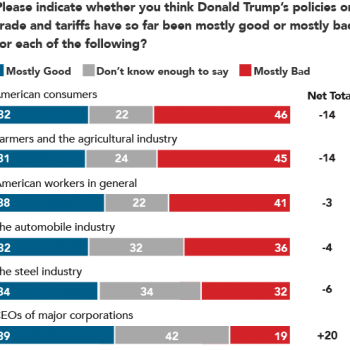
Americans name rising prices for everyday goods and the impact on farmers as top reasons to doubt the president’s approach on trade policy.
Many progressives argue that tariffs, used in the right way and for the right reasons, can provide long-term benefits to American workers and ultimately consumers, for example by improving wages for workers domestically and labor standards abroad. The public, however, fail to see Trump’s tariffs this way when it comes to wages and cost of living. Just 13% of Americans believe his trade policies will save them money in the short term; thinking over the long term, that number rises to just 18%. The number is higher for the long term among supporters with reservations (30%), but it’s only 10% for undecideds.
Americans say that rising prices on everyday goods are the biggest source of doubt when it comes to Trump’s particular approach to trade and tariffs. “Farmers getting hurt” emerges again as another top-ranking concern, below rising prices.
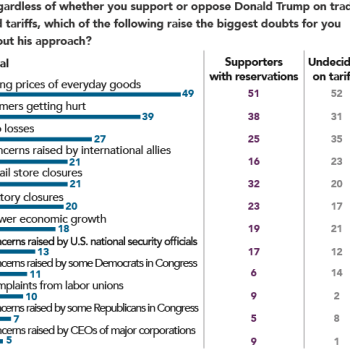
Progressives can argue the losers of Trump’s trade policy are everyday people, while the winners are corporate interests and the wealthy.
Besides specific information and economic proof points, respondents were
also exposed to broader narratives about Donald Trump’s approach to trade and tariffs and asked whether each one raises doubts about the approach. The findings show several of the narratives resonate with Americans across the political spectrum, including the more persuadable groups.
Once again, the direct impact of Trump’s reckless approach on Americans’ wallets – here, linked to the broader struggle many Americans face with the rising cost of living – emerges as a top-testing message against Donald Trump’s approach to trade and tariffs. Notably, the cost of living argument echoes previous Navigator findings that when it comes to Americans’ personal experience with health care or the economy more generally, the cost of living is a crucial lens.
Another strong message is the prospect of lasting damage to America’s relationships with international allies.
Finally, tying the raw deal for everyday workers to the massive benefits going to special interests, particularly drug companies, oil companies, and corporate shareholders and CEOs in general, is also an effective frame that raises doubts for many Americans about the president’s record on trade policy. Thus, progressives can lean into concerns like costs, while also elevating the issues of corporate elites who continue to benefit from the status quo.
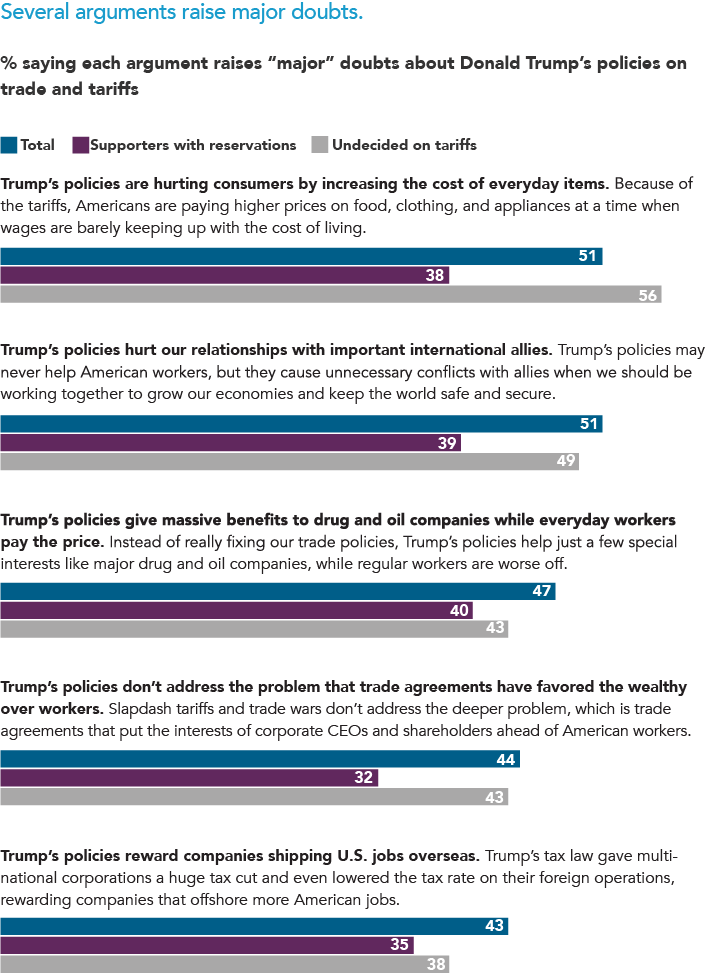
About The Study
Global Strategy Group conducted a public opinion survey among a sample of 1,003 registered voters between July 11-14, 2019. 119 additional interviews were conducted among political independents with no partisan lean. The survey was conducted online, recruiting respondents from multiple opt-in online panel vendors. Respondents were verified against a voter file and special care was taken to ensure the demographic composition of our sample matched that of the national registered voter population across a variety of demographic variables.

